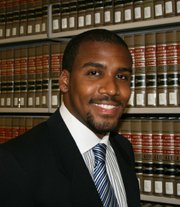John Grisham's racially charged novel, "A Time to Kill," took us on a mesmerizing journey that tapped into our inner psyche as it relates to the racial divide in the state of Mississippi. "A Time to Kill," which some consider to be Grisham's magnum opus, featured the ever-so-glaring and, may I add, uncomfortable dichotomy of black vs. white.
When making his closing argument, the charismatic white defense attorney eliminated the "black vs. white" mentality of the jurors and substituted it with simple empathy. Grisham's protagonist proposed the notion during closing arguments of "What if she were white?" This question reversed the color of the young victim's skin, allowing empathy to show her beautiful features. By using empathy strategically, our hero lawyer (bet you don't hear that phrase everyday) tugged at the heartstrings of his audience and the jurors, securing the verdict he fought so hard to obtain.
I have previously described empathy as simple, and that's because, basically, it is. Empathy is easily defined as the ability to understand and share the feelings of someone other than oneself. Surely, a word so easy to understand and a concept that is just as easy to grasp would have any reasonable person concede that this ability resides in the hearts of most, if not all.
The present-day world far too often showcases racial injustice of its own. The tragic death of Michael Brown in Ferguson, Mo., leaves us with an opportunity to embrace the simple notion of empathy just as Grisham's fictitious jurors did. Feelings of fear, pain, mistrust and anger have consumed the African American community since the grand jury decision proclaimed that shooting an unarmed black teen dead and leaving his body in the hot Missouri sun for four hours isn't enough to establish the low legal burden of probable cause.
That a grand jury essentially decided that the shooting of an unarmed teen isn't enough to even conduct a fair fact-finding trial angers the African American community in a way that seems to confuse the masses. Many people are baffled at the forms of protest since the grand jury decided to not let a dead young, black teen have his story heard in court. The overwhelming majority of protesters in Ferguson and this country are peaceful, law-abiding citizens who are simply exercising basic civil liberties, which the U.S. Constitution grants to them.
These protesters represent those who feel fear, pain and mistrust. Most have found a way to bottle their anger and take Dr. Martin Luther King Jr.'s route of ultimately not becoming what you despise or protest. A miniscule faction of protesters chose to take an alternate route. They chose to release their anger the only way they deem fit—through looting, aggression and the destruction of property. An eye-for-an-eye mentality, if you will.
The fear, pain, mistrust and anger the African American community feels toward law enforcement dates back to post-Reconstruction when Jim Crow laws were implemented. Then, the domestic-terrorist organization known as the Ku Klux Klan used law enforcement as a tool to carry out lynches, burnings and a laundry list of other heinous crimes against African Americans. This association has had lasting consequences, along with other law enforcement initiatives such as the "War on Drugs." History has greatly contributed to the mistrust we in the black community feel toward law enforcement, which we associate more with harassing and killing than protecting and serving.
These factors shouldn't shock anyone. That said, it has baffled me to witness the lack of empathy the majority has displayed as it relates to the different emotions that consumed a certain faction of the population since the grand jury decision. In order to get the majority to truly understand, should one take the John Grisham route?
Let's try it. Imagine a world that featured a young, white unarmed teenager, walking home. A black police officer shoots him dead and leaves his body in the street for four hours, even as many white witnesses give accounts implicating the officer. Even though the community is overwhelmingly white, black police officers make up the vast majority of the law enforcement population. Imagine a grand jury deliberation, which features a black prosecutor, majority-black jurors and a presiding black judge. Essentially, the courtroom would be made up of black people deciding issues that directly affect everyone.
How would the majority react in such a reversal—the same or differently? If differently, then I have wasted your time, and I sincerely apologize. However, if you think that maybe the majority would feel the same fear, pain, mistrust and anger, then you, my friend, have caught a case of empathy.
Leslie McLemore II is a Jackson native, now in Washington, D.C. He is a proud graduate of Jackson State University, North Carolina Central University School of Law (J.D.) and American University Washington College of Law.
See the JFP's full archive of Ferguson coverage here.



Comments
Use the comment form below to begin a discussion about this content.
comments powered by Disqus